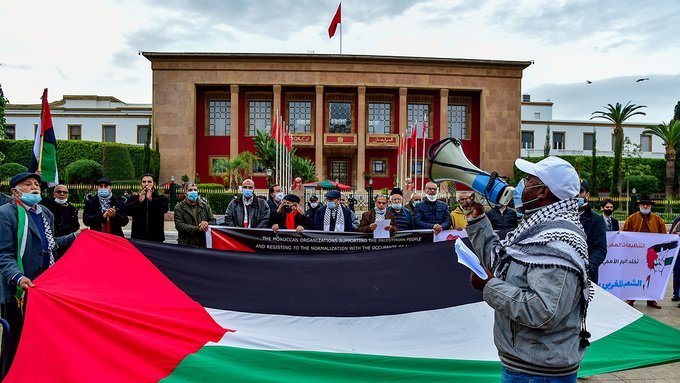
What Morocco’s Agreement With Israel Means for the Wider Middle East
How significant is it that Morocco now becomes the sixth Arab state to establish diplomatic relations with Israel?
It clearly adds to the momentum behind Arab-Israeli normalization. Only two Arab states, Egypt and Jordan, had formally recognized Israel in the seventy-two years between its founding in 1948 and 2020. But with Morocco now following in the footsteps of the United Arab Emirates, Bahrain, and Sudan, four more have done so this year alone.
The Israel-Morocco deal will reportedly allow for direct flights between the two countries, as well as expanded tourism and business exchanges that will help both their pandemic-stricken economies. Normalization further reduces Israel’s diplomatic isolation and adds to its legitimacy, a long-standing goal of Israeli governments and its population across the political spectrum.
At the same time, Moroccan officials have not committed to opening an embassy in Israel—only “liaison” offices—and deny that the agreement entails full diplomatic relations, underscoring the enduring limits to Arab-Israeli rapprochement.
Are other Arab states likely to follow?
In time, yes. There is a lot of speculation that next could be Oman, which has already publicly hosted Israeli Prime Minister Benjamin Netanyahu, though the new sultan seems to want to proceed cautiously. The biggest prize for Israel, though, would be recognition by Saudi Arabia, which has so far denied any intention to follow its neighbors.
Normalization would be highly controversial in Saudi Arabia, where conservative clerics are already chafing at recent social reforms and the public has been conditioned by decades of visceral anti-Israel propaganda in schools and in mosques. Saudi leaders, as the self-proclaimed custodians of the two holy mosques, in Mecca and Medina, also worry about the withering criticism they would receive from regional rivals in Iran and Turkey, who would accuse them of betraying Muslims by selling out the Palestinians.
Unconditional Saudi normalization with Israel would also violate the 2002 Arab Peace Initiative, launched by then Saudi Crown Prince Abdullah, which offered normalization with Israel only in exchange for Israel’s withdrawal from occupied territories and a resolution of the Palestinian issue. Under these circumstances, it’s hard to see King Salman departing from the conditions established by his late brother Abdullah.
Current Crown Prince Mohammad bin Salman—from a generation for whom the Palestinian cause no longer resonates with the same intensity—could have a different view once he assumes the throne.
Could the Saudis just be waiting for the Joe Biden administration?
There is some speculation that the Saudis are holding back to offer normalization as a “gift” to the incoming Biden administration. Biden and other Democrats have been highly critical of Saudi Arabia over its war in Yemen, human rights practices, and the killing of U.S.-based journalist Jamal Khashoggi, so Riyadh could be thinking that recognizing Israel—which has strong bipartisan support in the United States—would score some points with the new team.
The Donald J. Trump administration has set a precedent of generously compensating Arab states with quid pro quos for their recognition of Israel—the UAE got approval for a $23 billion arms package, including advanced drones and F35 fighters; Sudan was given financial assistance and removed from the State Sponsors of Terrorism list; and Morocco got long-desired U.S. recognition of its claims to sovereignty over the disputed Western Sahara. Although supportive of normalization, it is unclear whether the Biden administration will be prepared to compensate Saudi Arabia for recognition of Israel.
How are the Arab normalization agreements likely to affect the Palestinians?
The logic behind the Arab Peace Initiative was that withholding recognition of Israel would provide leverage for a deal with the Palestinians. That leverage did not work, however, and now nearly twenty years later, growing numbers of Arab states are pursuing other priorities.
Morocco clearly decided that developing its economic ties with Israel and winning U.S. recognition of its sovereignty in Western Sahara were too important to pass up, especially as denying Israel recognition seemed to be having no impact.
Morocco, like the other Arab states that have recognized Israel, insists it will still work for a two-state solution, but this time by engaging with Israel rather than boycotting it. The Palestinians are understandably skeptical.

What does U.S. recognition of Moroccan sovereignty over Western Sahara mean for that long-running dispute?
It is a major diplomatic coup for Rabat, but it could intensify the conflict between the Moroccan government and the Polisario Front rebels who are fighting for Western Sahara’s self-determination.
Polisario leaders have already said that their struggle will continue. Few, if any, other international actors—most of whom still support a United Nations–led process to resolve the territorial dispute—are likely to follow Washington’s lead.
And both Republican and Democratic critics in the U.S. Congress have complained that Trump’s concession to Morocco—even for the good cause of normalization with Israel—sends the wrong signals about self-determination and the principle of taking territory by force. The U.S. deal with Morocco is about Israel, not Western Sahara.











